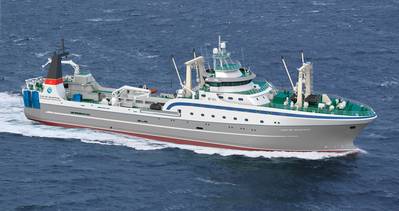OKEANRYBFLOT Orders Another 'Supertrawler'
Tersan Shipyard in Turkey has signed a contract to build a new 108-meter freezer stern trawler for one of Russia's leading fishing companies. OKEANRYBFLOT's new trawler is slated for delivery in mid-2022 and will be the sister vessel to newbuild no. 1096 planned to be launched in June this year.
The ST-191L design from Skipsteknisk is a 108- by 20-meter factory trawler, with accommodation for up to 150 persons on board. The vessel will be equipped with two main engines, each 4,060 kW, driving one CP propeller. Two 1,900 kW auxiliary engines will also be installed.
The vessel will fly Russian flag, and has RMRS class, including substantial ice reinforcements, reefer notation, and one-man bridge class.
The vessel is built for trawling Alaska Pollock in the Sea of Okhotsk, as well as Herring, Mackerel and Pollock in the Pacific. The vessel is arranged for pelagic and semi-pelagic trawling, using two main trawl winches working in combination with ice trawl gallows and four large pelagic sweep line drums. A trawl ramp and two wide trawl ways are facilitated. The ship is also arranged for stern pumping.
For intermediate storage of the catch, refrigerated seawater is provided to temporary buffer tanks and to the receiving and factory feeder tanks.
The vessel will be fitted with a pollock factory, to produce fillets and H/G. Pollock roe and liver will be extracted. Pollock can also be round frozen.
In addition, pelagic lines will be installed, where herring and mackerel will be filleted or round frozen.
The vessel can freeze up to 450 metric tons of product per day in automatic and manual horizontal plate freezers as well as a IQF freezing tunnel.
Frozen products will be packed in boxes and stored in a semi-manual fashion at -28 C° in refrigerated cargo holds of up to 4,700 m3.
All residual raw material and by-catch will in general be produced as fish meal and fish oils. A meal and oil factory with capacity to process up to 230 metric tons of raw material is installed. Fish oils will be stored in dedicated containers.
Cargo offload will primarily be carried out to reefer vessels moored alongside while at sea, using interconnected union purchase derrick systems. Offshore replenishment of fuel, cartons, provisions and other consumables and equipment will also be carried out during such transhipment operations.















